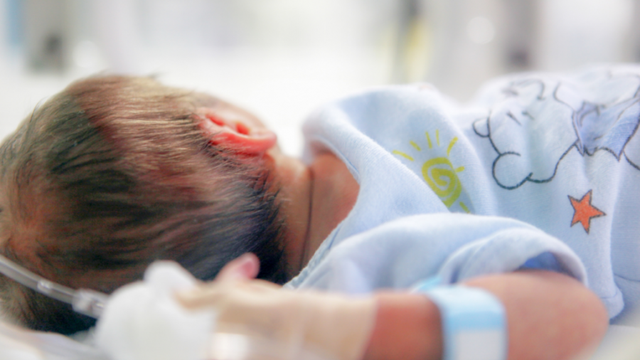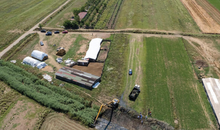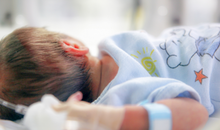
 Flash News
Flash News
Sailing suspended due to bad weather in Vlora
Megaoperation/ Group based in Durres, names of Albanian traffickers revealed
Why was the operation carried out after the elections? The question that embarrassed Altin Dumani
A 24-year-old man was found dead in Lake Farka.
Money, businesses, television/ What was seized during the mega-operation? Two officers involved in the criminal scheme
The decline in births is accelerating, 26% fewer babies in 4 years! Here are the cities most affected by this phenomenon

Almost two years have passed since the 2023 census was conducted and the country still does not have an official annual population, but indirect data such as births and emigration show that the country's demographic profile is rapidly deteriorating.
In the first quarter of this year, 4,662 babies were born across the country, a 14% decrease compared to the same period in 2023.
From the first quarter of 2021 to 2025, births across the country have decreased by 26%. The pace of decline in births nationwide has accelerated after the pandemic. Comparing only the data for the first quarter, it is noted that the number of babies in the first quarter of 2019 was 15 percent lower than in the same period in 2011. The data shows that after the pandemic, especially with 2025, births have suffered a sharp decline in all regions.
In the northern regions, births are falling faster. Despite being ranked with the highest dependency ratio of the young population in age, Kukës suffered the largest drop in births nationwide at more than 22% in the first quarter of 2025 (see attached graph).
Kukës and Dibra, poor territories, faced high waves of emigration in the last decade. As a result, births in these areas fell by over a fifth within a year, INSTAT reported.
Births in Tirana have also suffered a sharp decline. The capital still has a strong internal migration flow, but the high cost of living, housing prices and trends towards fewer children have reduced fertility. Tirana is the only region that has a contrast, as the population is growing and is experiencing a sharp decline in births. In the first quarter of 2025, Tirana was the second in the country for the decline in births with 18%.
The coastal and southern regions have a milder decline in births. Vlora, Gjirokastra and Berat recorded single-digit decreases, having experienced strong declines in previous years and having had aging populations for years.
Although the country is experiencing economic growth, this is not being reflected in the improvement of demographic indicators. Economic growth and the decline in birth rates are going inversely proportional.
The only pro-birth policy known as the baby bonus of 40 thousand lek for the first child, 80 for the second, 120 thousand for the third, seems to be a symbolic value compared to the real cost of raising a child.
In most cases, the costs of housing, private education, and the uncertainty of the job market prevent young couples from having children./ Monitor
Latest news



Israel's Eurovision result raises questions about voting
2025-05-21 17:23:29
Florence, two Albanians arrested with 23 kg of cocaine
2025-05-21 17:03:20
Sailing suspended due to bad weather in Vlora
2025-05-21 16:58:12
The abolition of the vote as a triumph of banality
2025-05-21 16:41:56


Operation "Bridge"/ Ekil Nderjaku is sentenced to "prison arrest"
2025-05-21 16:08:32

Who needs more physical exercise: Women or men?
2025-05-21 15:43:25
Former Ukrainian politician shot dead near a school in Madrid
2025-05-21 15:32:18
Operation "Bridge"/ Ekil Nderjaku is given another security measure in his cell
2025-05-21 15:22:37
Chocolate will reach high prices! Cocoa production in serious crisis
2025-05-21 15:11:34




"Grandma", "beast", the nicknames used by Albanian and Italian traffickers
2025-05-21 14:26:47
Pope Leo asks Israel to allow humanitarian aid into Gaza
2025-05-21 14:18:42

Document/ How did Nuredin Dumani hit Xhevdet Troplini's group of traffickers?
2025-05-21 14:05:45

Megaoperation/ Group based in Durres, names of Albanian traffickers revealed
2025-05-21 13:42:44
Former politician shot dead outside his children's school
2025-05-21 13:39:27
A ka BE-ja ende mjete efektive për t'i shkaktuar dhimbje Rusisë?
2025-05-21 13:26:33
Berisha: We will never accept such choices, no one can force us to accept them
2025-05-21 13:25:29




A 24-year-old man was found dead in Lake Farka.
2025-05-21 12:37:34

The abolition of the vote as a triumph of banality
2025-05-21 12:18:53

The only name for May 11th is: Electoral Terrorism
2025-05-21 12:06:25


Letter-order from Belgium, SPAK checks 4 premises, 33-year-old arrested in Berat
2025-05-21 11:37:31
Hajj 2025/ Everything you need to know about the annual pilgrimage to Mecca
2025-05-21 11:28:43

The appeal of the GJKKO leaves the head of the Road, Roven Zeka, in prison
2025-05-21 11:02:16

Kuçova! 66-year-old man sexually harasses 17-year-old girl
2025-05-21 10:41:40

Mental disorders and obesity threaten adolescents
2025-05-21 10:22:04


19 killed in Gaza by Israeli attacks, most of them children
2025-05-21 09:50:03
Tabaku: SP seeks to usurp independent institutions
2025-05-21 09:40:19



Is the Socialist Party's supermajority a danger to democracy?
2025-05-21 09:01:54


Video/ Explosives found at Veliera in Durrës, near Vangjush Dako's apartment
2025-05-21 08:32:15
The lack of flights at Vlora airport jeopardizes tourism guarantee contracts
2025-05-21 08:22:54
Horoscope, what do the stars have in store for you today?
2025-05-21 08:09:02

Morning Post/ In 2 lines: What mattered yesterday in Albania
2025-05-21 07:47:36







38 people arrested for conspiracy in Venezuela, among them an Albanian
2025-05-20 21:18:15

Torrential rainfall hits southeastern France, 3 confirmed victims
2025-05-20 20:49:14

Shehaj: Our votes will never unite with Edi Rama
2025-05-20 20:24:31
The ship "Butrinti" rescues 13 migrants in the Aegean Sea, including 2 children
2025-05-20 20:01:12
Video/ Revolt in Corfu prison, Albanians and Georgians set fire to cells
2025-05-20 19:51:04
Biden diagnosed with cancer, questions about his health in the White House
2025-05-20 19:37:01



How SP candidates withdrew from vote complaints after Rama's message
2025-05-20 18:34:12
Trump-Putin conversation/ Analysis: Who won in the two-hour call?
2025-05-20 18:15:00
Suspicions of electoral crimes, SPAK checks the municipality of Klos
2025-05-20 18:02:48
Vucic message to the Serbian coach: Go to Tirana and win against Albania
2025-05-20 17:50:48
Këlliçi: The diaspora vote is a massacre, the violations are flagrant
2025-05-20 17:39:37
Accused of drug trafficking in Italy, the Supreme Court acquits Kreshnik Farruku
2025-05-20 17:20:53

Venezuelan President: Ecuador's Albanian Mafia seeks to sabotage our elections
2025-05-20 17:01:14
Accident at "Shkalla e Tujanit" in Tirana, a car overturns after the collision
2025-05-20 16:51:18
Diaspora vote, Source: Process more symbolic than with real impact
2025-05-20 16:41:12
Why Careful Reporting on Tragic Cases Is Important
2025-05-20 16:17:12
KPA dismisses Tirana judge Ardiana Bera from office
2025-05-20 16:13:30
Even young people with hypertension, 35% of 18-year-olds with blood pressure
2025-05-20 16:01:07


Enigma/ How did the SP grow more than in the previous elections this year?
2025-05-20 15:12:50
Threat against President Osmani, KMDLNJ: Risk to security and democracy
2025-05-20 15:01:56

Hungary's parliament approves withdrawal from the International Criminal Court
2025-05-20 14:50:00
Defamation lawsuit against Albana Vokshi, hearing postponed at the GJKKO
2025-05-20 14:36:20
